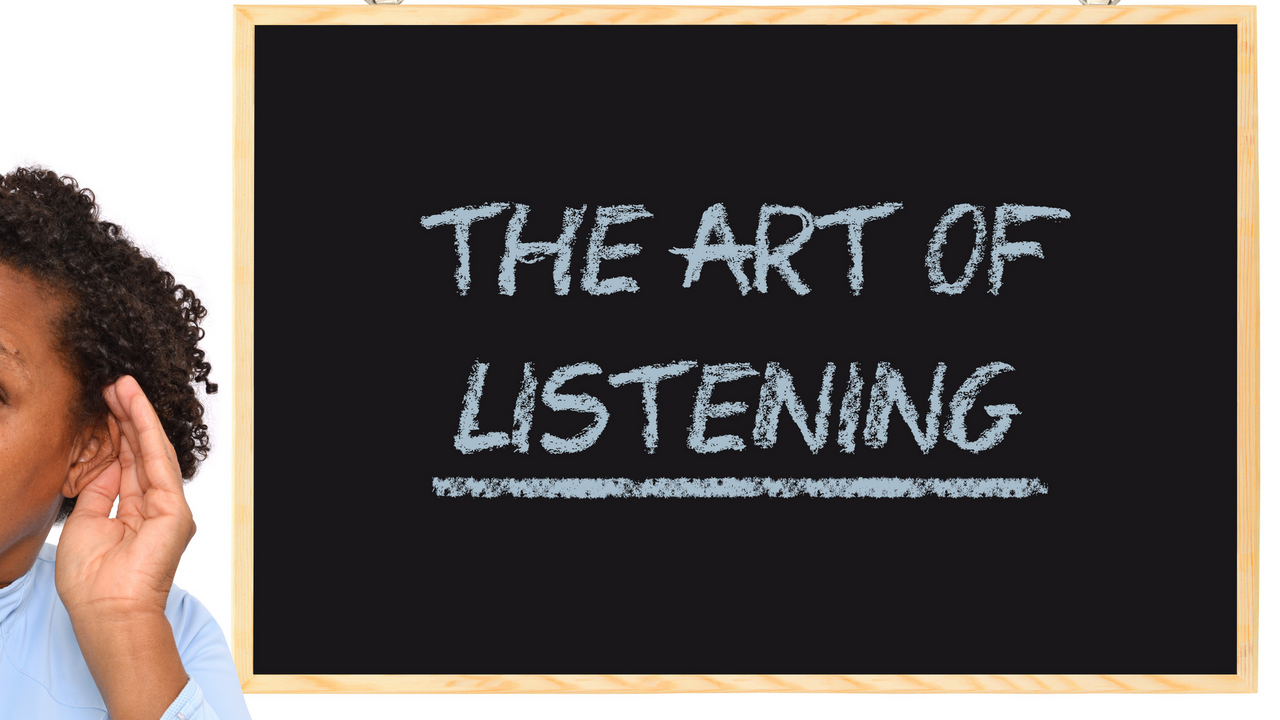Key Business Principle [Active Listening]

In our team training, for all positions, this is one of the very first lessons we cover. Why? If an individual doesn't have good listening skills, I genuinely feel like basically everything I say is a waste, because I am not sure if they heard me or not.
For most people, when we introduce this study it is a new concept. Typically it is something they never even thought of or considered as a real "thing". We hear all types of reactions to the study and what I find interesting is during our presentation, it is easy for people to point out other peoples lack of good listening skills and a little more difficult to admit that they themselves do not have as great of listening skills as they originally thought.

Listening is a Skill?
What about you? Have you ever thought of listening as a skill or is this the first time you have ever really thought of listening as a skill? The word skill is defined as; the expertise or talent needed in order to do a job or task. Job skills allow you to do a particular job and life skills help you through everyday tasks. There are many different types of skills that can help you succeed at all aspects of your life whether it's school, work, or even a sport or hobby. This post will show you how you can improve your skills of listening to help you thrive in your chosen field. Improving this skill will help you not only in your relationships but also in business to maximize your desired results in marketing, sales, customer service, supervision, and management of staff.
Depending on the study you are researching there are several different levels of listening. For this assignment, we will study six of them. Communication is the key to ANY type of relationship whether it be business, personal, or a general acquaintance.
In event planning specifically, you must be able to achieve a high level of listening. Clients want you to carry out their wishes and without listening properly you will be setting yourself up for mistakes and an unhappy client.

Ignoring
The lowest level of listening is called ignoring – not listening at all. If you are distracted by anything while talking to an individual, they can get the impression that you are ignoring them. This level of listening typically can be seen as a negative only, however, there can be seen in a positive light when there is a lot of chaos around you and you need to have an intense focus.
Pretend Listening
Pretend listening is most easily detected in face-to-face conversations. If you’re talking to the other person and they have that look in their eye like they are going over a grocery list or something. On the phone, you may be able to tell when they say things like “I see” and “OK,” etc. You may not realize it but people can tell you are distracted.
Selective Listening
During selective listening, we pay attention to the speaker as long as they are talking about things we like or agree with. If they move on to other things we can easily slip into another form of listening like pretending to listen or ignoring them altogether.
Comprehensive Listening
In order to be able to use Comprehensive Listening effectively and gain understanding the listener first needs to utilize appropriate vocabulary and language skills. Sometimes we can begin using overly complicated language or technical jargon, which can be a barrier to the listener.
Comprehensive listening can be further complicated by the fact that two different people listening to the same thing may understand the message in two different ways. Comprehensive listening is complimented by sub-messages from non-verbal communication, such as the tone of voice, gestures, and other body language. These non-verbal signals can greatly aid communication and comprehension but can also confuse and potentially lead to misunderstanding. In many listening situations, it is vital to seek clarification and use skills such as reflection aid comprehension. It can be easy to misread what you take as a cue from body language when it could easily be caused by something else.

Attentive Listening
Attentive listening occurs when we carefully listen to the other person, but while they are speaking we are deciding whether we agree or disagree, determining whether they are right or wrong. You may even be thinking of a rebuttal or comeback. Instead of paying close attention to the other person, we’re formulating our response to what he or she is saying.
At all four of these levels it should be evident that we are listening to our own perspective, and in most cases with the intent to respond from our experience.

Empathic listening
The fifth level of listening is Empathic Listening. Empathetic listening is the top level of listening. To be successful, you must teach yourself to treat every conversation as though this is the first time you’ve ever heard this, even though you may have heard it many times before. Discipline yourself to see it through the eyes of the other person. This is called empathic listening. Empathic listening is the highest level of listening, and the hardest to accomplish.
So how do you achieve this highest level of listening?
First, you have to clear your mind and not have an end in mind. Listen to hear what they are saying. If you don't understand where the person is coming from, ask them to explain more and go into more detail. Your not waiting to interrupt, or to show how smart you are, or even to tell them your opinion on what they are talking about. That's right, your not waiting to respond. Just to listen.

Conclusion
Consider examining how those you are close to listen to you and how you listen to them and see which types of listening levels you notice most. Are you happy with how well others listen to you? Are you happy with how you listen to them? Do you think they may be aware of how you listen to them? Do you want to improve your listening skills?
Are you an Empathetic Listener? If not, do you want to become one? I know for many this is not only a HUGE challenge, but believe it or not, for some, it is literally impossible. Take the next few weeks to challenge yourself in this area. Listen to those around you and have no comment, no suggestion, nothing to add. Just listen.
Stay connected with news and updates!
Join our mailing list to receive the latest news and updates from our team.
Don't worry, your information will not be shared.


